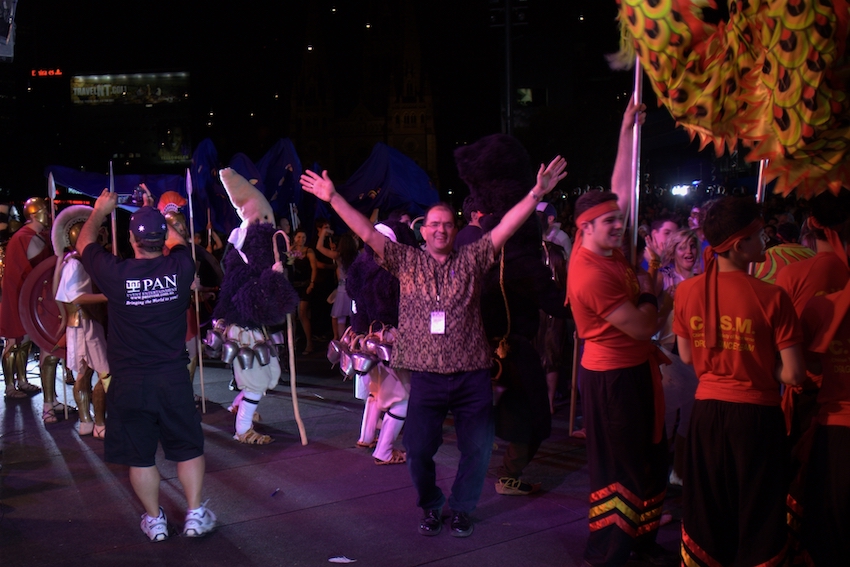
In this piece by Cultural Infusion’s CEO and Founder, Peter Mousaferiadis explains how his leadership style has changed since his career as a classical music composer and orchestral conductor.

Symphonic conducting was the first style of leadership I was acquainted with, when I found myself studying it in my youth in the early 90s.
The Western Classical Orchestra tradition is probably the only leadership position left in western society which will tolerate a dictatorial approach to leading. Can you imagine if our Prime Minister, or any other liberal country leader, attempted to rule this way?
Suffice to say, I do not imagine it would go over well!
Almost three decades on, I now know there are many more styles of leadership available to me, fortunately, with our ever-changing environment and the emergence of different waves of social justice movement. Most recent, and most notably particularly in the business world, there has been an explosion of diversity, equity and inclusion leaders. This has given leaders, from CEOs to politicians, no choice but to adopt a more adaptive and consultative leadership style than ever if they want to succeed.
Leadership is learning
In my case, I have found it helps to make a regular admission of vulnerability. The more I learn the more I realise I don’t know. It’s this approach that allows me the room to grow in my role every day.
As a leader, I find that the best ideas are those that include everyone so keeping in mind that we all start from different places and perspectives is important to creating inclusive environments which can foster innovation, growth and acceptance that all opinions are valid.
As with most things, language is an important aspect of leadership. Language defines and shapes our reality because it gives expression and shape to how we think. It defines how we behave towards each other, but often is unconsciously deeply interconnected to colonial history.
There’s no power in power
I strive daily to decolonise the language embedded in our unconscious – for example, the word ‘power’ is one I avoid.
Why, you may ask?
The word ‘power’ lends itself to weaponisation – the dominance of one party over another. Historically, this dynamic has led to misuse and abuse, so we prefer to use other terms to describe leadership and those working in the DEI space. Depending on the context the word ‘power’ can be substituted with a range of alternative words including ‘potential’, ‘ability’, ‘strength’, ‘vigour’, ‘realisation’, ‘recognition’, and ‘opportunity’.
Recognising that each individual has their own lived experience – social movements, ethno-religious-linguistic backgrounds and worldviews, among other factors. I am forever striving to approach encounters from a non-socially normalised, non-ethnocentric, non-value-centric position.
Every setting is different. The challenge of the increasingly globalised world we are finding ourselves in will require new forms of communication, forms of language that are able to overcome what sometimes seem to be incommensurate differences.
Effects of COVID
The global pandemic is hurtling us ever forward and creating history at what seems to be a fast-tracked pace. I find every single one of us is surrounded not only by uncertainty, but by lightning pace change. Countless decisions are required by every individual on a daily basis – possibly the same number of decisions a contemporary adult makes daily, is as many decisions our grandparents made in a lifetime.
I have adopted the daily mantra that the only sustainability is adaptability. This is the only way I find strength in change and living in the moment.
How, then, do we deal with change being so constant?
Social theorists hypothesise that the amount of change that will happen in the next 10 years will be more than humanity has experienced in the past 1,000 years.
Change is a reality, for governments, organisations and individuals all. We have a choice – we can resist, and be left behind, or we can embrace change with positivity and enthusiasm. There is uncertainty, yes, but we need to see the opportunities opening up to us.
Change is so ubiquitous that strategic plans become redundant before they are even finalised. I now like to think of life as a journey and that every moment of it is a destination. Adopting this thinking allows me to incrementally build and pivot in an appropriate way to the changes in my environment that turn up in rapid succession.
I would like now to return to the concept of vulnerability. All humans are vulnerable, to some extent, and always have been. The recognition of this is vital in developing a culture of trust.
Recognising vulnerability as a virtue stands alongside other such virtues as respect, inclusiveness and kindness, which I hold dear. The unwillingness of people to acknowledge vulnerability means we are not genuinely open with each other. If we cannot admit our mistakes, shortcomings, concerns and weaknesses, we cannot build on a foundation of trust.
Lack of trust leads to conflict
This failure to build trust invariably sets the scene for fear of conflict. If we lack trust, then we are incapable of unfiltered conversations and unable to debate our ideas with genuine conviction. The veiled discussions and guarded comments that will occur erode trust further.
A lack of healthy conflict means a lack of commitment. Within organisations, this might manifest itself as feigned agreement during meetings and the harmony that seems to pervade the organisation is superficial at best, artificial at worst. This is not the culture in my organisation that I aspire to.
Lack of commitment sets the tone for lack of accountability and some of us may hesitate to liaise with each other. This cannot lead to productivity.
When we fail to hold each other accountable, and raise issues – with kindness, not confrontation – this will result in inattention to detail, the rise of individual egos, division. In other words, the opposite of collectivist co-operation for the betterment of the organisation.
There is nothing too complicated about the ideas I have espoused here – but in practice, it becomes much more difficult to maintain. In order to live these ideals, it requires discipline, persistence and, above all, patience.

As a leader, I am forever trying to co-create a culture and an organisation where everyone continues to feel valued, appreciated and always never losing sight of our organisation’s vision. It’s reinforcing the vision that keeps us on track and focused. This coupled with leaning in with a heavy heart I feel gets the best out of my staff.
Cultural Infusion, the organisation I founded and am CEO of, strives for a world that is culturally and socially cohesive. Our core values are based on the richness of our collective cultural heritage.
The range of products and services we have developed includes our flagship offering, Diversity Atlas. This world-first diversity mapping platform ensures no-one is left out by providing baseline data from which organisations can aspire to work towards creating equitable, inclusive and representative spaces. It also provides a snapshot of opportunities for business growth.
The role of DEI
The ideals of diversity, equity and inclusion underpin every aspect of our organisation. Not only in the range of services and products we offer, but in the way we aim to better ourselves as a group of people.
Reflecting on the work I was doing three decades ago and the work I am doing today, there would seem to be so many differences – but with one, static and singular vision as a consistent thread.
The products and services we offer may have changed, but the ‘why’ behind them has not.
Recognising diversity means recognising in particular diversity of experience, thought and cultural background. Understanding this has allowed me to adapt to my environment. I have come to observe from my own practice that the more diverse an organisation, the more resilient it is – when we pool our diversity, we aggregate strength, resilience and the capacity to innovate. We are able to more successfully respond to challenges.
As for my life as in classical music… That dictatorial form of leadership will always be necessary for a conductor, however to lead successfully in my current role, I’ve had to put down the baton.
Share this Post
